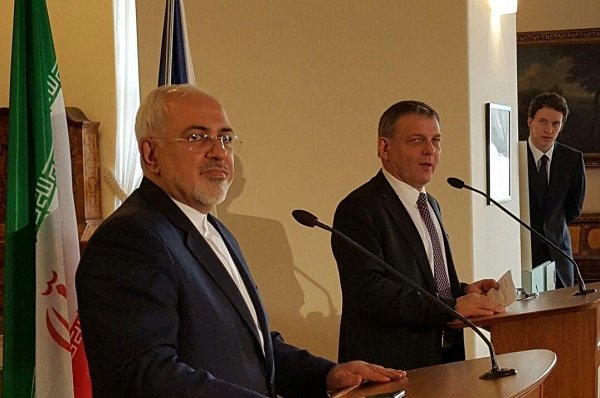Foreign Minister Mohammad Javad Zarif, who is paying a visit to Czech Republic, conferred with his counterpart Lubomir Zaoralek on Friday.
In a joint press conference with Lubomir Zaoralek, Zarif called JCPOA a reasonable agreement, good for everybody. “That's our preference, but it doesn't mean we do not have other options,” he said underlining that the Islamic Republic of Iran was determined to stay faithful the JCPOA.
He stressed that after JCPOA grounds for cooperation between the two countries have been provided. “We welcome the efforts to upgrade Iran-Czech ties to ambassador level."
Zarif welcomed collaboration of Czech officials to reach a solution to the Syrian crisis and the fight against ISIL, saying “Fight against ISIL terrorists exists not only in Syria but also in Iraq and Yemen.”
Iranian FM reiterated that Iran’s cooperation with the Czech and European Union could be expanded to the political, economic, cultural and pharmaceutical fields and can include the fight against terrorism.
Touching upon JCPOA implementation, Zarif said “the historical deal is a reasonable multilateral agreement that has been approved by the UN Security Council. “The United States has not fully implemented its obligations under the nuclear agreement.”
He went on to stress that the JCPOA was an international agreement not a bilateral one, thus every party of the deal has to remain committed to it.
Meanwhile, the foreign ministers of Iran and the Czech Republic signed a memorandum of understanding on stepping up political consultations between the two countries.
The Iranian foreign minister also on Friday held talks with President of the Czech Chamber of Deputies of the Parliament Jan Hamacek and Prime Minister Bohuslav Sobotka. During the meeting, the two sides discussed ways to improve political and economic cooperation, as well as the latest developments in the Middle East, particularly the crisis in Syria, and the fight against terrorism and extremism.
They also discussed the development of cooperation between Tehran and Prague, particularly in trade and economics, energy, banking, tourism and interactions in the European Union.
Being on a tour to three Eastern European countries, Zarif heading a delegation, arrived in Prague, capital of Czech Republic, on Thursday evening.
Zarif's trip to Prague is the last leg of his visit to three Eastern European countries which had already taken him to Slovakia and Romania.
LR/82303792,82303708,82303827
